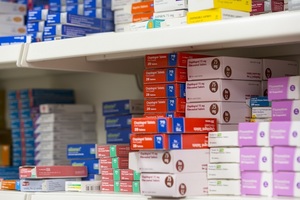Medicines and medical products supply: government updates no-deal Brexit plans
The government has announced plans to launch procurement exercises to secure freight capacity if the UK leaves the EU with no deal.

Packets of medicines on a pharmacy shelf.
The Department of Health and Social Care (DHSC) will lead a procurement exercise to secure an ‘express freight service’. It will transport small medical supply consignments into the UK within 24 hours if the UK leaves the EU without a deal.
This is designed to support the uninterrupted supply of medicines and medical products where there is an urgent need or where a suppliers’ own logistics plans are disrupted.
Additional plans are also being put in place for a freight capacity framework agreement that will provide government departments with the ability to secure freight capacity for our critical supply chains as and when required. Medicines and medical products will be prioritised on capacity that is procured.
This latest procurement activity forms part of the wider plan for minimising any supply disruption. As well as freight capacity, this includes the building up of buffer stocks across the following sectors:
- medicines
- medical devices and clinical consumables
- blood and transplants
- vaccines and countermeasures
- supplies for clinical trials
- non-clinical goods and services
It also includes:
-
additional warehouse space for stockpiled medicines, including ambient, refrigerated and controlled drug storage
-
working with industry to improve trader readiness in preparation for the new customs procedures that will come into force on day 1 if we leave the EU without a deal
-
changing or clarifying regulatory requirements so that companies can continue to sell their products in the UK if we have no deal
-
arrangements to deal with shortages in addition to normal shortage management routes, enabling ministers to issue serious shortage protocols to pharmacists
All these arrangements echo the plans put in place ahead of 29 March and will be essential to the continuation of medicines and medical products if the UK leaves the EU without a deal.
The department continues to centrally coordinate contingency measures to mitigate risks to supply. This removes the need for any stockpiling at local level, which could cause medicine shortages and put patient care at risk.
Leaving the EU with a deal remains the government’s priority. However, it must plan for every eventuality, including no deal.
DHSC continues to work closely with the devolved administrations, industry trade bodies and suppliers, the NHS and other main stakeholders to ensure that it is as prepared for leaving the EU without a deal in October as it was on 29 March and 12 April.
More information can be found in the written ministerial statement to the House of Commons on Tuesday 26 June and a letter from the government to suppliers.